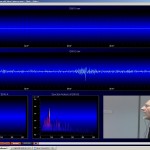Yawning consistently poses a conundrum to neurologists and neuroscientists. Increasingly, evidence is found to link neurological disorders through the commonality of yawning episodes and contagious yawning. Despite discrete incidences (such as parakinesia brachialis oscitans) in brain stem ischaemic stroke patients, there is considerable debate over the reasons for yawning, with the mechanism of yawning still not fully understood. Cortisol is implicated in the stress response and fatigue; repetitive yawning may be the link between neurological disorders and with a strong correlation between yawning and a rise in cortisol levels. Evidence has now been found in support of the Thompson Cortisol Hypothesis that proposes cortisol levels are elevated during yawning [1]. Additional data is in press, and further research is planned with longitudinal consideration to neurological disorders such as multiple sclerosis and stroke. Funding for such initiatives is currently being sought.
[1] Thompson, S.B.N., & Bishop, P., 2012. Born to yawn? Understanding yawning as a warning of the rise in cortisol levels: randomized trial. Interactive Journal of Medical Research, 1(5), e4:1-9. Doi: i-www.jmr.org/2012/e4/
 Capturing a yawn: initial observations – Dr Simon Thompson
Capturing a yawn: initial observations – Dr Simon Thompson










 Dr. Ashraf cited on ‘Modest Fashion’ in The Guardian
Dr. Ashraf cited on ‘Modest Fashion’ in The Guardian NIHR-funded research launches website
NIHR-funded research launches website Academics write for newspaper in Nepal
Academics write for newspaper in Nepal New paper published on disability in women & girls
New paper published on disability in women & girls Global Consortium for Public Health Research 2025
Global Consortium for Public Health Research 2025 MSCA Postdoctoral Fellowships 2025 Call
MSCA Postdoctoral Fellowships 2025 Call ERC Advanced Grant 2025 Webinar
ERC Advanced Grant 2025 Webinar Horizon Europe Work Programme 2025 Published
Horizon Europe Work Programme 2025 Published Horizon Europe 2025 Work Programme pre-Published
Horizon Europe 2025 Work Programme pre-Published Update on UKRO services
Update on UKRO services European research project exploring use of ‘virtual twins’ to better manage metabolic associated fatty liver disease
European research project exploring use of ‘virtual twins’ to better manage metabolic associated fatty liver disease